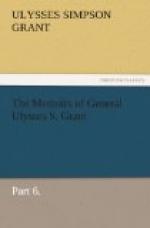Sherman wrote to my adjutant general, Colonel J. A. Rawlins, embodying his views of the campaign that should be made, and asking him to advise me to at least get the views of my generals upon the subject. Colonel Rawlins showed me the letter, but I did not see any reason for changing my plans. The letter was not answered and the subject was not subsequently mentioned between Sherman and myself to the end of the war, that I remember of. I did not regard the letter as official, and consequently did not preserve it. General Sherman furnished a copy himself to General Badeau, who printed it in his history of my campaigns. I did not regard either the conversation between us or the letter to my adjutant-general as protests, but simply friendly advice which the relations between us fully justified. Sherman gave the same energy to make the campaign a success that he would or could have done if it had been ordered by himself. I make this statement here to correct an impression which was circulated at the close of the war to Sherman’s prejudice, and for which there was no fair foundation.
(14) Meant Edward’s Station.
(15) CHATTANOOGA, November 18, 1863.
MAJOR-GENERAL W. T. SHERMAN:
Enclosed herewith I send you copy of instructions to Major-General Thomas. You having been over the ground in person, and having heard the whole matter discussed, further instructions will not be necessary for you. It is particularly desirable that a force should be got through to the railroad between Cleveland and Dalton, and Longstreet thus cut off from communication with the South, but being confronted by a large force here, strongly located, it is not easy to tell how this is to be effected until the result of our first effort is known.
I will add, however, what is not shown in my instructions to Thomas, that a brigade of cavalry has been ordered here which, if it arrives in time, will be thrown across the Tennessee above Chickamauga, and may be able to make the trip to Cleveland or thereabouts.
U. S. GRANT
Maj.-Gen’l.
CHATTANOOGA, November 18, 1863.
MAJOR-GENERAL GEO. H. THOMAS,
Chattanooga:




